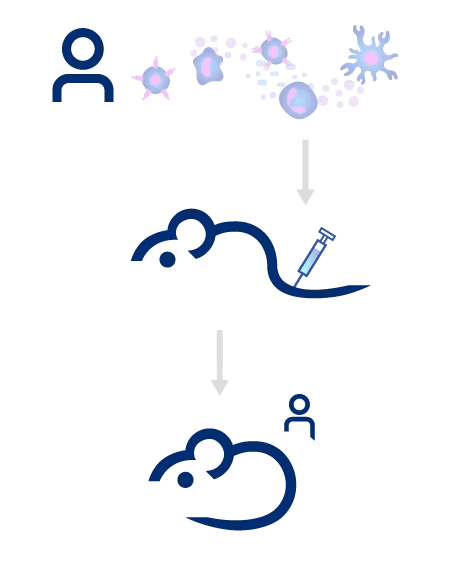Humanized NSG mice are a therapeutically translational platform for the evaluation of human immune cells in vivo, the evaluation of single and combinatorial drug approaches, and the production of predictive data for the clinic. These models can be used in immuno-oncology applications, stem cell biology, and therapeutic efficacy/toxicity testing. With thousands of publications, The Jackson Laboratory's Humanized NSG Platform is your partner for translational research.

Produced by engraftment of human cord blood derived hematopoietic stem cells (HSCs), these models yield stable multilineage immune cell development and enable long-term longitudinal studies. Customization and CD34+ HSC engraftment of other NSG and NRG variants are also available.
| Strain Names | Human Gene Expression | Benefits |
|---|---|---|
|
CD34+ Hu-NSG™ |
N/A |
|
|
CD34+ Hu-NSG-SGM3 |
KITL (SCF), IL3, GM-CSF |
|
|
CD34+ Hu-NSG-IL15 |
IL15 |
|
|
CD34+ Hu-NSG-SGM3-IL15 |
KITL (SCF), IL3, GM-CSF, IL15 |
|
|
CD34+ Hu-NSG-FLT3 |
FLT3 Ligand |
|
|
CD34+ Hu-NSG-FLT3-IL15 |
FLT3 Ligand, IL15 |
|
Created with adult peripheral blood mononuclear cells, the PBMC Hu-models feature quick engraftment and enable short-term efficacy and toxicity studies with mature human T cells.
| Strain Names | Human Gene Expression | Benefits |
|---|---|---|
|
PBMC Hu-NSG™ |
N/A |
|
|
PBMC Hu-NSG™ MHC I/II DKO |
N/A |
|
CD34+ Humanized NSG and NSG variant mice are ready to ship 8-12 weeks following engraftment. With our guarantees of at least 25% CD45 engraftment, researchers can be confident in the abundance of human immune cells for their therapeutic study. CD3+ T cells are a critical cell of interest in immuno-oncology and our off-the-shelf Humanized NSG mice produce high and stable levels of CD3+ T cells following engraftment.

Discover the indispensable role of humanized mice in biopharmaceutical research and their crucial importance in accurately modeling human diseases and immune responses. Immune cell humanized mice recapitulate critical components of the human immune system such as cells, cellular receptors, protein, cell-cell interactions, and individual diversity across a variety of donors. Through the engineering of a humanized immune system, researchers can rapidly advance the development of targeted treatments, providing valuable insights across various medical conditions.
Not what you're looking for?
Visit our Resource Hub